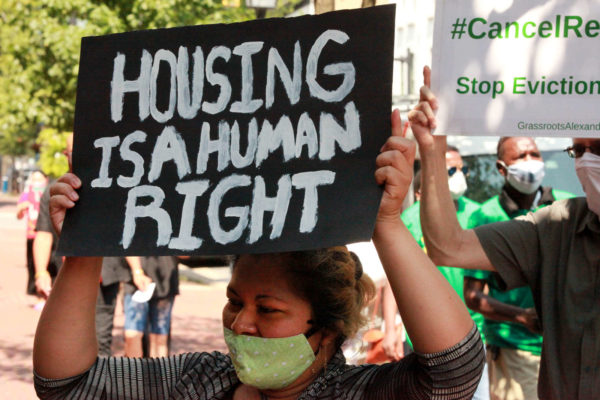
Everything seemed rolled up tight for a legal retail market for cannabis, but a veto from Gov. Glenn Youngkin set those plans ablaze.
Panel program Agenda: Alexandria is meeting tonight (Monday) to discuss the current state of the cannabis market with speakers including Commonwealth’s Attorney Bryan Porter and the owner of a dispensary network.
According to the program:
The Virginia General Assembly passed legislation this past session to create a retail market for cannabis — Governor Glenn Youngkin vetoed this legislation. The Commonwealth had legalized cannabis for adult possession and cultivation in 2021.
Cannabis is currently legal and available only to treat medical conditions at state-regulated dispensaries. But concerns linger as to the health effects of chronic cannabis consumption and to what extent a black market for cannabis contributes to criminal activity.
The program tonight will tackle what is and isn’t legal now, and whether that should change.
Panelists scheduled to attend tonight are:
- Trent Woloveck — Chief Strategy Director at Jushi, owner of Beyond Hello dispensaries
- Jeremy Preiss Virginia Cannabis Control Authority (CCA) Authority’s Chief Officer and Acting Head — Regulatory, Policy, and External Affairs
- Robert B. Nealon, Esq. — Senior Partner of Nealon & Associates, P.C
- Bryan Porter — Commonwealth’s Attorney for the City of Alexandria
The panel discussion is scheduled for 7 p.m. tonight at the Lyceum (201 S Washington Street). Tickets for non-Agenda Alexandria members are $10. The event can be viewed in person or online.
Photo via Wesley Gibbs/Unsplash

Near the end of Black History Month, Agenda Alexandria is bringing together a panel to discuss Black Alexandrians who helped shape the history of the city.
The talk, called “Resilience and Legacy: Unveiling Alexandria’s Black History” will highlight those who struggled against slavery and Jim Crow-era discrimination.
The panel, scheduled for Monday, Feb. 26, will be moderated by Agenda Alexandria Board Member and President of the Alexandria Branch of the NAACP Darrlynn Franklin.
Panelists will include:
- Audrey Davis: director of the African American History division of the Office of Historic Alexandria
- Octavia Stanton Caldwell: associate pastor of outreach at Shiloh Baptist Church
- Krystyn Moon: professor at the Department of History and American Studies at University of Mary Washington
The panel discussion will start at 7 p.m. at the Lyceum (201 S Washington Street).
Tickets are $10 for non-Agenda Alexandria members and the talk can be viewed in person at the Lyceum or online.

An Agenda Alexandria panel later this month will dive into how the city’s digital landscape isevolving and what it means for local residents.
In 2021, the city broke ground on a new municipal fiber optic network to boost internet speeds at city facilities and schools and earlier this year Internet provider Ting started to break Comcast’s hold over Alexandria’s internet.
Beyond just the technological angle, the panel will also take a look at legal considerations of the city moving from a third-party provider to establishing its own network.
According to the website:
Join us at Agenda Alexandria’s upcoming program as we delve into the dynamic landscape of broadband expansion within the City of Alexandria. As technology continues to evolve, the expansion of broadband providers holds the potential to reshape the very fabric of our city, influencing how we work, live, and conduct business.
Panelists include:
- Sara Crifasi, Of Counsel at Levine, Blaszak, Block & Boothby, LLP
- Dr. Elizabeth Hoover, Chief Technology Officer at Alexandria City Public Schools
- Fernando Torrez, President of NanoTech Computer Consulting, LLC
- Dr. Alan Shark, Executive Director of Public Technology Institute (PTI)
The panel is scheduled for Monday, Jan. 22, at 7 p.m. in the Lyceum (201 S Washington Street). Tickets are $10.
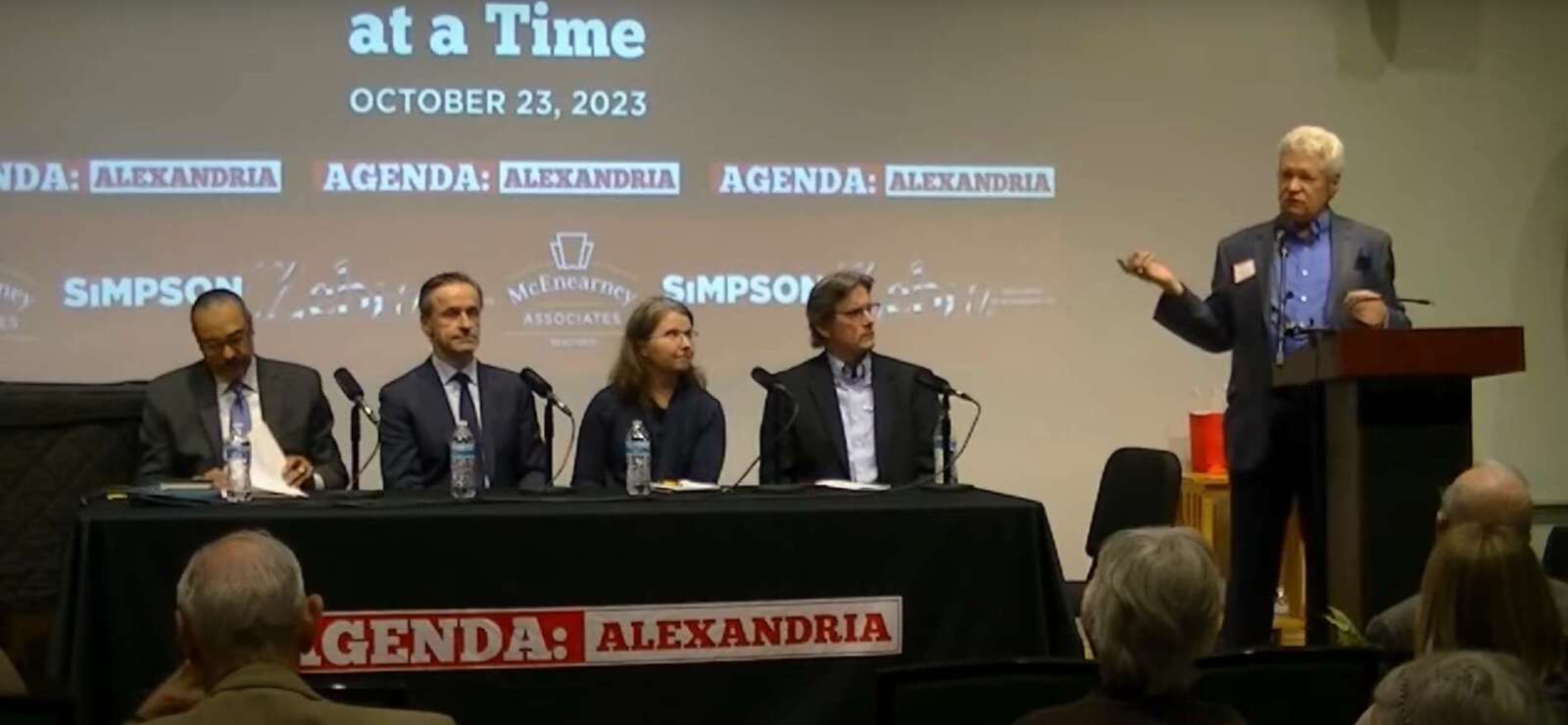
A panel last night on the city’s Zoning for Housing/Housing for All overhaul dived into the back and forth on the issue, including questions about the timeline from proposal to final review.
The proposal includes a number of changes to the city’s housing zoning, the most high-profile being allowing two-to-four-unit dwellings in formerly single-family residential zones. Other substantial changes include making it easier to build housing in industrial zones and eliminating minimum parking requirements for dwellings with up to four units in enhanced transit zones.
The discussion, hosted by Agenda: Alexandria, brought together:
- Roy Byrd, chair of The Coalition for a Livable Alexandria, which has been vocally critical of the planning process
- Susan Cunningham, a candidate for Arlington County Board who campaigned in opposition to a similar process in Arlington
- Stephen Koenig, a commissioner on Alexandria’s Planning Commission
- Karl Moritz, the planning director for the City of Alexandria
Beyond some of the main points within the specific Zoning for Housing/Housing for All plan, one of the criticisms has been that the planning process has been rushed. Depending on how you’d define the process as starting, the discussion of the zoning changes has been going on since either November 2022 or since 2018/2019, when the City of Alexandria met with other localities to discuss the regional lack of affordable housing.
“In 2018/2019 we first realized, after the 2008 recession, the region and the city had not been producing housing at the same pace as we had been before the recession,” Moritz said. “Each year, [we were] falling further and further behind in meeting the demand for housing. The consequences of not meeting that demand are legion.”
Moritz said in addition to harming those seeking affordable housing, Moritz said staying in a home that’s rapidly accelerating in value has consequences for the homeowner.
“We have a crisis we’re trying to address,” Moritz said. “We’re not just starting the discussion in March 2023; we started this discussion in 2019, and in many ways, we started this discussion a long time earlier.”
But the full Zoning for Housing/Housing for All recommendations weren’t revealed until early September, three months before final review before the City Council, scheduled for Nov. 28. Moritz said those months have been filled with in-depth, thoughtful and considered discussion.
Those three months have been a whirlwind of public discussions, and Koenig said in his view, a delay would cost more time and resources without much gain:
What I’ve observed over the years with Director Mortiz’ work: there’s a tremendous about of effort and responsibility to balance all those resources. So when you come down to something that sounds relatively simple like “why don’t you take another couple months” the questions in play here are: what would we be able to do that we have not already done, not to mention what is the cost of taking that additional time.
My personal take, for what it’s worth, is everything we need to know to make a thoughtful, responsible recommendation as Planning Commission to Council is in front of us now…
I personally don’t feel that another couple of public meetings is necessarily going to add anything to that.
Byrd, however, said there have been changes in the framing of the public discussion over those few months that show more discussion is needed to get the community on the same page. Byrd noted that much of the early conversations were about using Zoning for Housing to create more affordable housing, which has at times been emphasized in other discussions.
“We’re no longer having the conversation we started in July about how do we create affordable housing; that discussion has moved on and changed,” said Byrd. “The changes have been staggering… We’re concerned that this is really a giveaway to developers. We understand it will enhance revenue for the city, but we’re doing a lot here and we’re doing it fast and we don’t understand ‘why the rush?'”
Cunningham said, when Arlington went through a similar process, there was a similar “morphing” of the public discussion as that went on.
“In our conversation across a similar time period, it morphed across the time and not everyone followed the morphing,” said Cunningham. “I think that, for me, is a call to slow down, even though slowing down has costs, and making sure that everyone is having the same conversation is important. What happened in Arlington, from my perspective, was people were having different conversations [and] we weren’t having those conversations well.”
The full discussion was posted online by Agenda Alexandria.
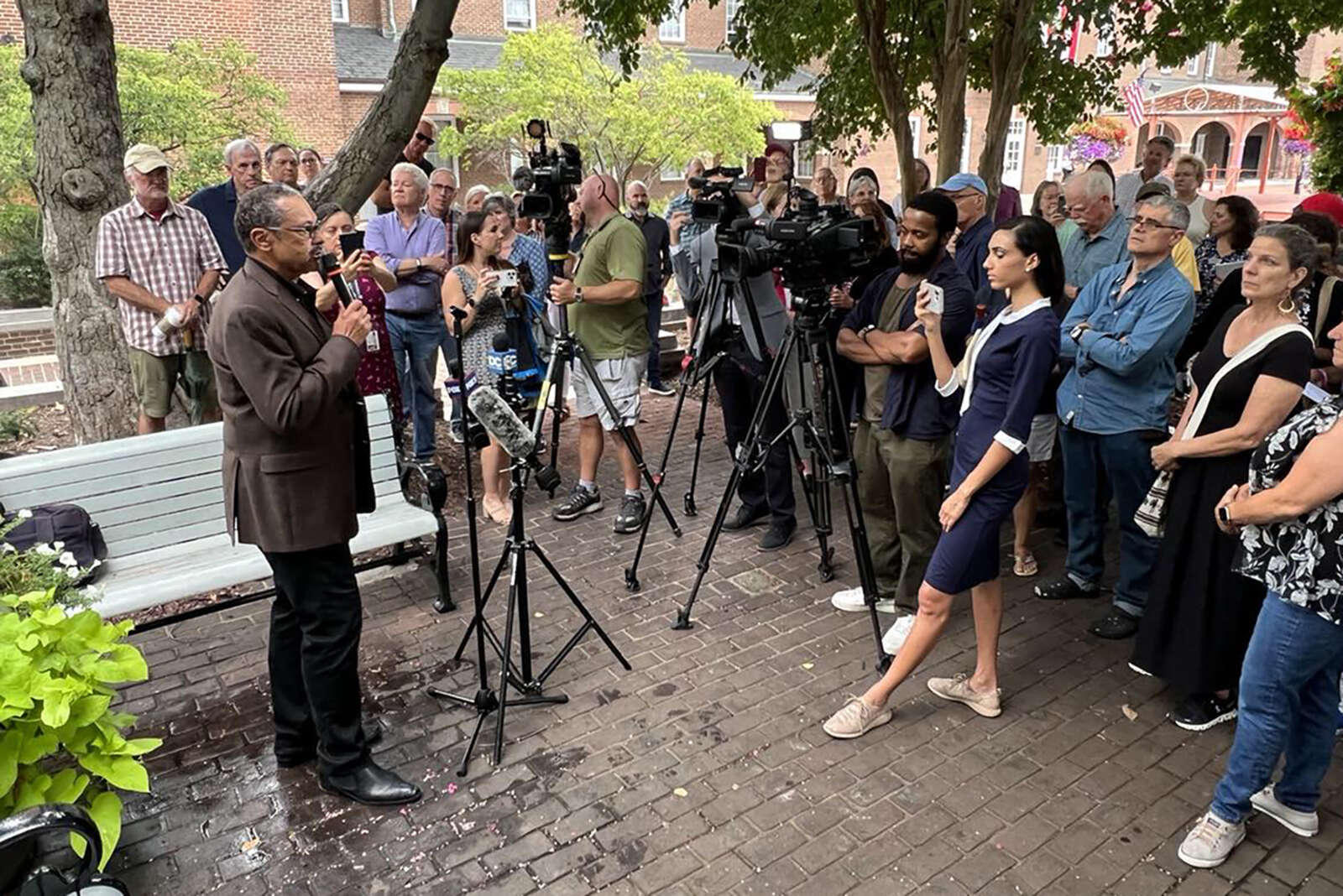
Discussion panel program Agenda: Alexandria is hosting a panel tonight to bring advocates and opponents of the city’s housing reform together for a showdown.
The chosen dueling ground will be the Lyceum (201 S. Washington Street) at 7 p.m., though onlookers can also view the panel online.
Tonight’s program is called “Shaping Alexandria’s Future, One Home at a Time” and will dive into the Zoning for Housing/Housing for All proposal.
The proposal includes a number of changes to the city’s housing zoning, the most high-profile being allowing two-to-four-unit dwellings in formerly single-family residential zones. Other substantial changes include making it easier to build housing in industrial zones and eliminating minimum parking requirements for dwellings with up to four units in enhanced transit zones.
Tickets are $10.
According to the program’s website:
As the cost of living continues to rise in Alexandria, there is a growing consensus about a long-term need for more affordable housing options, especially housing that can be purchased to foster wealth creation.
This event promises to be a pivotal conversation addressing the urgent need for more affordable housing in Alexandria and proposed sweeping changes to the city’s zoning code. As the cost of living continues to rise in Alexandria, there is a growing consensus about a long-term need for more affordable housing options, especially housing that can be purchased to foster wealth creation.
However, critical questions still need to be answered, such as the size and location of these units, the potential necessity for additional infrastructure, and the potential impact on historic districts.
Panelists tonight include:
- Roy Byrd (Coalition for a Livable Alexandria)
- Susan Cunningham (Candidate for Arlington County Board)
- Stephen Koenig (Commissioner, Alexandria Planning Commission)
- Karl Moritz, Planning Director for the City of Alexandria

Next week, Agenda Alexandria has its sights set on climate change: looking both at how things like rising heat and water levels will impact the city, and what the city can do to mitigate that impact.
The panel discussion is scheduled for 7 p.m. at the Lyceum (201 S. Washington Street) and can be streamed online. Admittance is $10.
“2023 is shaping up to be Alexandria’s hottest year in recorded history — a health risk for residents, tourists and workers as well as nature,” the organization wrote. “The Potomac River is rising much faster than projected, threatening our waterfront parks and homes. Flooding and damaging storms may be the new normal. Climate change is here and we are experiencing hotter, wetter, and wilder weather.”
The discussion will focus on what Alexandria can do to combat the effects of climate change. According to the website:
What’s a small City to do? Our city’s carbon emissions come from its people’s activities in an already-built town – their homes, cars, and workplaces- how can we reduce the risks of climate threats to the people and places we love? Alexandria’s Energy and Climate Change Action Plan (ECCAP) lists the actions needed to reduce carbon emissions by 50% by 2030 and 80 to 100% by 2050. It also lays out strategies to adapt to the increased precipitation and extreme heat of a changing climate. Can we do it? What to do and how to pay?
Panelists on the discussion include:
- Ryan Freed, Alexandria’s Climate Control Officer
- Rose Stephens-Booker, an energy professional, formerly with the Department of Energy
- Kathie Hoekstra, Chair of the Environmental Policy Commission
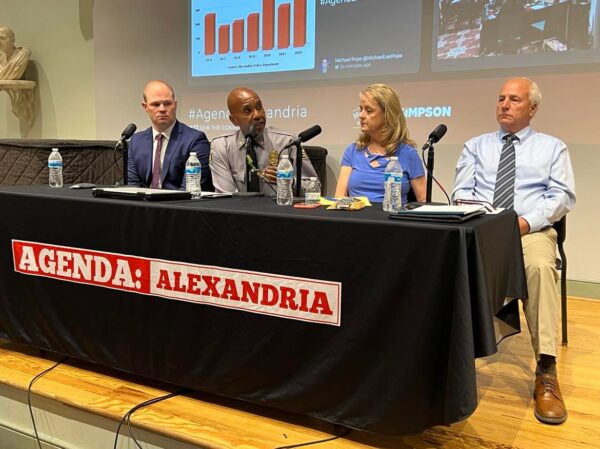
Amid a crime surge, Alexandria Police Chief Don Hayes said Monday night that the police force is seeing a “plethora” of guns out on the streets.
Alexandria’s gun-related crime jumped 100% in 2022 over 2021, and Hayes says that overall crime is up 27% for the year.
“I can tell you there are a plethora of guns out on the street,” Hayes said at an Agenda Alexandria panel on the crime surge. “I just read the last four daily watch reports that we have. There was one where officers stopped the car and they arrested the individual for having burglary tools in the car and also there was a gun there. Your officers made an arrest of a stolen car the other day, and in the stolen car there was a stolen gun. One of the shootings that happened about probably three weeks ago, up off of Madison Street, everyone one of the three (suspected) individuals that were stopped all had guns.”
Monday’s panel was held at The Lyceum, and included retired Sheriff Dana Lawhorne, Alexandria City High School parent Jennifer Rohrbach and Deputy Commonwealth’s Attorney Robert Strange. It was moderated by Agenda Alexandria chair Rod Kuckro.
Rohrbach witnessed two fights outside Alexandria City High School last year when she went to pick up her child, prompting her to begin advocating for student safety.
“I witnessed two fights in front of the school picking my daughter up on different days,” she said. “And then a student was arrested with a loaded glock very close to the classroom at the front door. So what I did is I started getting involved in online groups and one thing led to another and so here I am advocating for safety in the city and for our kids.”
Hayes said that a lot of the uptick in gun violence is attributable to “crews” of violent youth and stopped short of calling them gangs. He also said that the guns seized are a mix of legal and illegal weapons.
“It’s the beefs that are going on between the crews, some from down Route 1, some from Woodbridge, some from Alexandria, and there is no one particular reason why it’s happening.” Hayes said. “I just think that things have changed and hopefully this is not going to be a norm, we can get a handle on this, and get them to do some other things that are constructive. But I will say this: that it’s been happening a lot, just not the same characters.”
The department’s strategy so far is to add police presence to high-crime areas, putting more cops in communities with public events and the strategically placement of mobile camera units. Hayes also said that his office is in constant communication with neighboring law enforcement agencies, as crime is up regionally and nationally.
Lawhorne, who served as sheriff from 2006 to 2021, said that there need to be harsher punishments for such offenses.
“These notification of shots fired, most are if Rod does something to make me mad, I drive over to his house, I stick my gun out the window, and I discharge it about 12 times with shell casings around the street,” Lawhorne said. “Rod’s going to return the favor. He’s going to drive back to my house and he’s going to do the same thing. That’s a simple explanation of kind of what’s going on… However, it’s done to intimidate others, but it is terrorizing neighborhoods and it’s unnacceptable.”
Lawhorne said that underage possession of a firearm is a class one misdemeanor, as is public discharge of a firearm.
“Unfortunately, sometimes those bullets hit property, or sometimes people, but let me say the majority they’re shooting in the air to intimidate somebody,” Lawhorne said. “Unless I hit somebody or their property it’s a class one misdemeanor. There needs to be harsher penalties for this reckless behavior.”
Hayes also said that the department is also short-staffed, and that significant resources are devoted to an increase in mental health-related calls for service.
“It’s a significant drain on our resources, and there doesn’t seem to be an end in sight,” Hayes said.
At only 15 square miles, Alexandria’s open space is in relatively short supply.
On Monday (Nov. 28), city leaders and experts will take the stage with Agenda Alexandria to discuss the city’s goal of increasing the city’s open space from 7.3 acres to 7.5 acres for every 1,000 residents.
“Today Alexandria meets this goal,” Agenda Alexandria said. “But, on the City’s current population growth trend Alexandria is in danger of falling short of community needs and environmental benefits as early as 2025.”
By 2040, Agenda Alexandria says that the shortage of publicly accessible open and green space will “likely” be acute by 2040. The city’s Open Space Steering Committee is tasked with presenting City Council with a proposal by the end of this year.
The Agenda Alexandria discussion will begin at 7 p.m. at the George Washington National Masonic Memorial (101 Callahan Drive), and include Jack Browand, the city’s deputy director of park services; Kurt Moser, co-chair of the Alexandria Open Space Steering Committee and president of the Four Mile Run Conservatory Foundation; and land use attorney Mary Catherine Gibbs.
In last month’s Agenda Alexandria panel, city leaders discussed trading building heights for affordable housing.
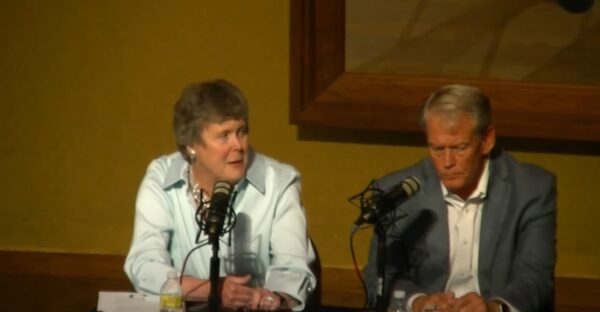
There are individual developments that can attract controversy but stepping back there’s a broader issue addressed at an Agenda Alexandria discussion last night with city leaders, developers and civic association representatives: whose vision shapes the future of Alexandria?
The discussion, moderated by Board Member Rod Kuckro, tackled a variety of development issues, including the slow death of office and commercial space in projects over the last few years.
For Carter Flemming, President of the Seminary Hill Association, there’s a concern that resident voices are being drowned out by the interests of developers.
“The voices of citizens need to be a better part of this equation,” Flemming said. “Many of the civic associations and the Federation believe over the last few years, the role of our associations and voices has been lessened as voices of developers and urban think tanks have taken a bigger role in our city… Many of us do not believe the City is working together with current residents. They’re building for a future we may or may not be a part of, but we should have a voice.”
On the City side, former Mayor Kerry Donley said there is an inherent incentive towards development for the City, as new development means more tax revenue to fund services.
“The City derives the bulk of its revenue from real property taxes; that’s how we grow and provide services,” Donley said. “It’s not accurate to say the council or the city is always looking in the developer’s favor, but under our way of governing in the Commonwealth of Virginia there is an inherent incentive for this locality and every locality to develop real property because that’s where we derive revenue to provide services.”
Donley and others in the discussion also outlined significant changes coming to what’s developed in Alexandria. Donley said the big push is for residential development, as brick-and-mortar commercial businesses were already facing a difficult battle against online retail pre-pandemic and a shift towards remote work drove a stake through the office market.
“Demand for commercial space is next to nill, but demand for residential is the highest and best use for properties,” Donley said.
Karl Moritz, Director of Planning and Zoning for the City of Alexandria, said the challenges from the pandemic and more force the city to reconsider older plans.
“We are, as Kerry was saying, facing a set of challenges that none of our jurisdictions have faced before,” Moritz said. “There is certainly a desire to ensure that our master plan, which is guiding orderly growth, is reflecting new challenges that are coming.
Moritz also said there’s a much greater emphasis now on bringing additional voices to city meetings beyond just civic associations.
“Our expectation is that people who have never been involved before are added to the mix,” Moritz said. “It’s a stronger system when more voices are heard.”
Austin Flajser, President & CEO of The Carr Companies, said he believes the voice of developers in city policymaking is overstated.
“Fundamentally, [development] starts with the rules in place,” Flajser said. “It starts with a small area plan and that shapes the concepts of what is viable and not viable… If there are developers that have a big voice in the process, I’d like to meet them. I don’t feel like I have a big voice in the process. We follow the rules as laid down.”
The next step, Flajser said, is to look at market demand.
“Just because I’m allowed to build a hotel doesn’t mean I’ll build a hotel if the demand isn’t there,” Flajser said. “I can’t imagine someone building an office building in the near future.”
One of the touchier topics raised in the discussion was single-family zoning. While city leaders have been reconsidering zoning laws in a push toward greater equity, some local residents have expressed concerns that the end goal is the elimination of single-family zoning.
The topic was raised, but only Moritz responded and with a somewhat nebulous answer:
First, because I’m a planner of a certain age: personally I feel I have responsibility as part of the regulatory infrastructure that allowed what started out as an intentional disinclusion of people of color from single family neighborhoods, intentionally keeping families of color from wealth-building opportunities, and that for years we pretended it hadn’t happened and it was okay because we’d legislated that people couldn’t be disciminated against. But that ignores the long-term impact on those families.
It’s a good idea to come together and talk about those things. As for what comes out of those conversations: I have an extraordinary optimism about Alexandria and its ability to talk through issues like that and come up with the right approach. I believe that those conversations would be healthy and I look forward to doing my part.
A recent Agenda Alexandria meeting with some of the city’s leading affordable housing advocates provided a deep dive into some of the unique challenges and opportunities in the field locally.
In particular, the panel looked at how addressing the affordable housing crisis in Alexandria has changed since the pandemic started.
Mary Lee Anderson, executive director of Senior Services of Alexandria, said for a year after the pandemic started that many of those on the panel would meet weekly and discuss ongoing affordable housing issues. Anderson said strong support from other non-profits and from the City of Alexandria helped maintain services like food delivery at levels above what neighbors were providing.
“We deliver two meals every day, one hot and one cold, where Arlington and Fairfax went to delivering frozen meals once a week,” Anderson said. “The only way we were able to continue doing that was because of the funding from the city and because [Deputy City Manager] Debra Collins the first week was having a City Council meeting and said ‘We’re not going to furlough any city employees and if any nonprofits need help let me know,’ and I was immediately typing ‘Debra, we need help.'”
Anderson said the pandemic forced Senior Services to lose 3/4 of their volunteers overnight, with many in city staff stepping up to fill that gap.
“Our city really stepped up,” Anderson said.
Mary Horner, housing justice staff attorney for Legal Services of Northern Virginia, said the surge in eviction cases caused by pandemic-related job loss forced her office to change its scope.
“Because of the influx of need with individuals who can’t pay the rent going to court, we’ve had to shift how we address these problems,” Horner said. “How are we going to actually provide assistance to so many people who have such a great level of need? It’s required a greater level of collaboration. I’m still representing clients but had to shift from a micro-focus to a macro-focus. How are we going to talk to as many people as possible? That’s one of the things we’ve really focused on, shifting the model from micro to macro.”
Added to those issues, Horner said, is the Virginia Rent Relief Program’s May 15 expiration date.
“We only have about three more weeks of this safety net before we have to turn back to local funds,” Horner said.
Horner said one of the difficult parts of the job is telling locals that there may be no choice but to leave Alexandria.
“At a certain point, when you’ve run out of rental assistance, an eviction might happen,” Horner said. “How do you afford to live here? When there is no answer there, the answer is you don’t live here anymore. I don’t like to give that practical advice, I would like to avoid it, but it comes up quite often because there’s not enough affordable housing.”
The other outcome Horner sees is families doubling up on into cramped units to keep their children in Alexandria’s school system.
“They end up living with another family and that’s when you see ten people in a two-unit building in Alexandria,” Horner said.
Horner said three areas, Arlandria/Chirilagua, Southern Towers, and the Landmark neighborhood account for most of the places where her offices is seeing the most need for eviction assistance.
For those who have been evicted. Allison Coleman, director of the Office of Community Services at the Department of Community and Human Services, said her office has been working to help get those kicked out of their homes get local storage for their belongings.
“One of the initiatives in eviction prevention is being able to work with a local moving and storage company to help those at risk of eviction,” Coleman said. “[That means] having access to a storage unit until they have a new affordable housing unit and having people to help them move in. That’s just one effort to be able to support them.”
The affordable housing advocates also said it was important to note that landlords aren’t always cartoonish villains in eviction stories and some have been at the table and been helpful.
“I think it’s important to note too that never were the landlords made out to be the bad guys in this whole scenario,” said Melanie Gray, director of Outreach and Mission at Historic Christ Church. “There was an effort to bring them to the table from the very beginning and recognize that they have needs too. They have financial responsibilities.”
Horner said one of the advantages in handling eviction cases in Alexandria is that the majority of landlords are large-scale property owners who can afford to take temporary revenue hits that smaller landlords can’t.
“One of the benefits of state rental assistance is that it’s a benefit for landlords and tenants, which is a very rare thing to find in eviction prevention: something that we can all agree on,” Horner said. “I don’t want to say it’s been easy, but it’s been an easier job getting landlords on board with this… We don’t have as many private landlords here. The majority of the landlords seeking rental assistance are large-scale landlords who aren’t as close to missing mortgage deadlines. We do have a few, but that’s one of the thins that’s made things easier here. We have these large landlords that can wait a little bit longer to get more money.”
In terms of long-term fixes, some of those on the panel said solving the affordable housing issues are inseparable from increasing density.
“For density: I don’t know what the alternative would be,” Horner said. “We’re seeing an increase in population. I don’t know how we solve that problem if we don’t have an increase in density.”
The full discussion is available below:



